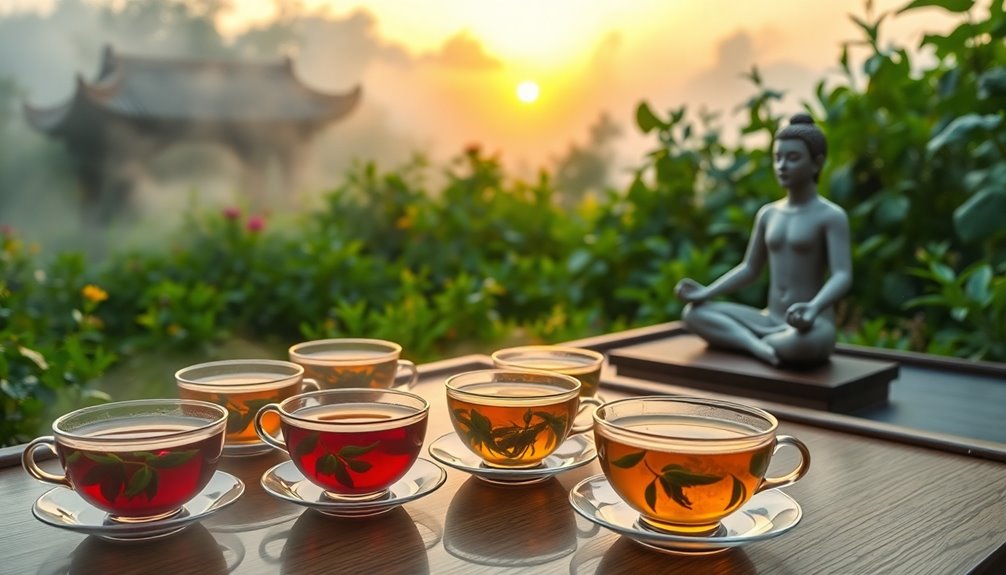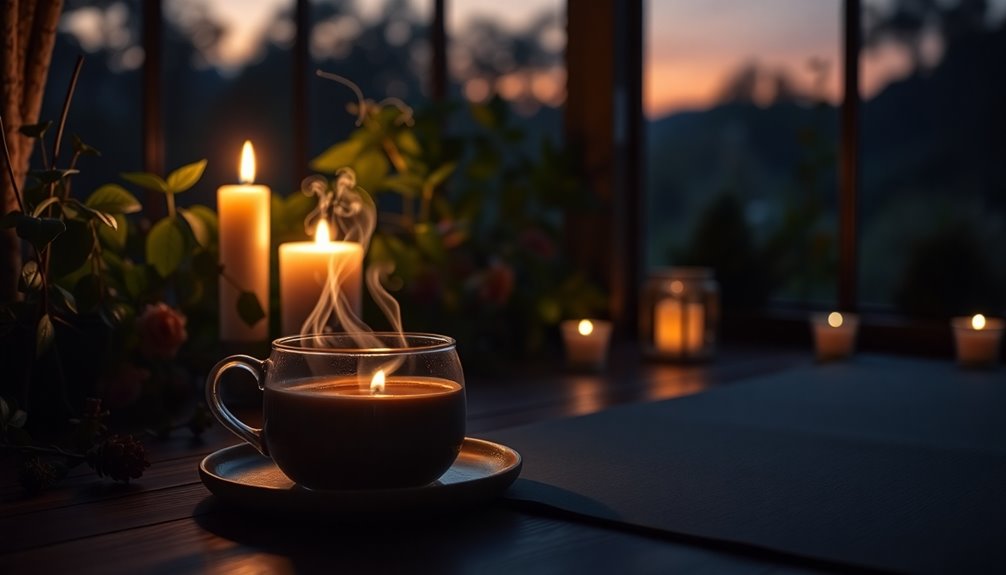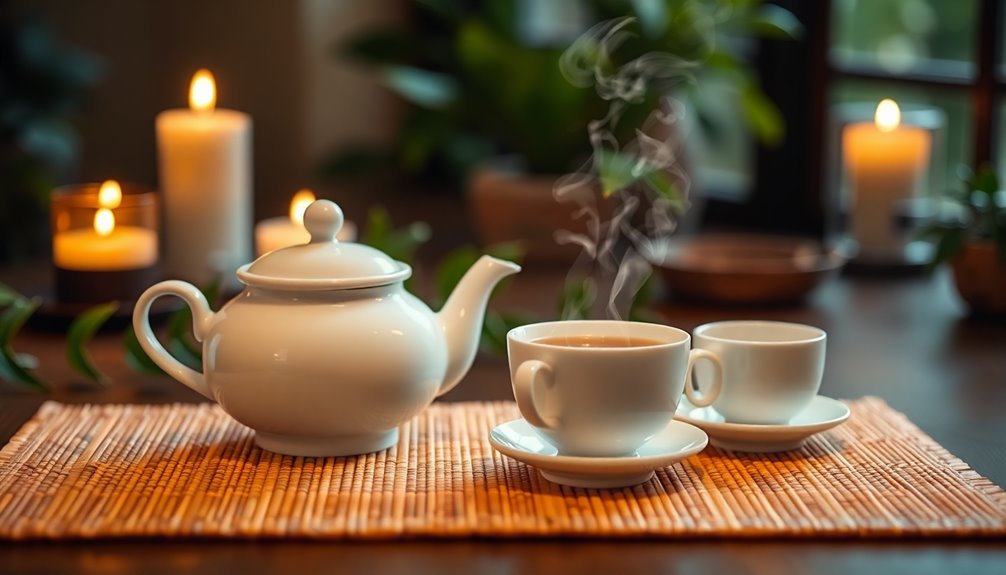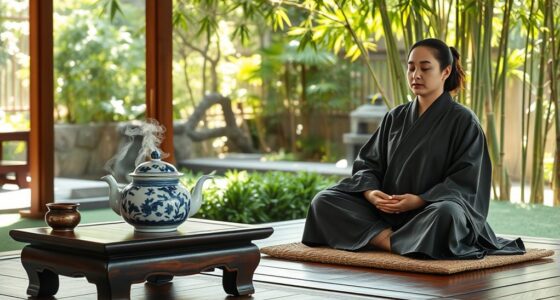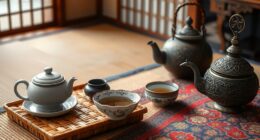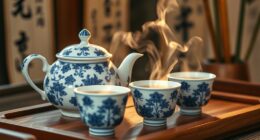Tea can really help you focus and relax during meditation. It has a special ingredient called L-theanine, which makes you calm but alert at the same time. Drinking tea, especially green or herbal kinds, helps reduce jitters from caffeine, so you can really enjoy the moment. The warm cup in your hands and the scent of the tea can ground you and enhance your breathing. Plus, engaging with the tea leaves and flavors can deepen your awareness while meditating. If you're curious about more benefits and tips for using tea in your practice, there's plenty more to explore!
Key Takeaways
- L-theanine in tea promotes a calm yet alert state, enhancing focus during meditation sessions.
- The ritual of tea preparation fosters mindfulness, helping practitioners stay present.
- Engaging with the sensory aspects of tea deepens awareness and mental clarity.
- Lower-caffeine teas like white or herbal options minimize jitters and support relaxation.
- The calming aroma of tea can soothe the nervous system, creating a tranquil meditation environment.
Introduction

When you think about ways to enhance your focus and relaxation, tea often comes to mind. This delightful beverage isn't just soothing; it's also packed with health benefits. One key ingredient in tea is L-theanine, an amino acid known for promoting a calm yet alert state. This makes tea an ideal companion for your meditation practices.
When you sip tea, you engage in the sensory rituals of preparation and consumption, which encourages mindfulness. This helps you ground yourself in the present moment, allowing you to focus better. The act of sipping slowly promotes deliberate breathing, enhancing your relaxation and deepening your meditative experience. Additionally, certain essential oils(natural antibacterial and antifungal properties) can complement the calming effects of tea, creating an even more serene atmosphere.
Moreover, tea provides a perfect balance of caffeine and L-theanine, improving your attention and alertness without the jitters you might get from coffee. Additionally, regular consumption of herbal teas such as chamomile tea may promote relaxation and improve sleep quality, further supporting your meditation journey.
Regular tea consumption is linked to improved cognition and reduced stress, both vital for achieving that tranquil state you seek during meditation.
Tea's Historical Significance in Meditation

Rooted in ancient traditions, tea has played a pivotal role in meditation practices, especially within Zen Buddhism. For centuries, the ritual of preparing and drinking tea has helped people cultivate mindfulness and presence. When you focus on the aroma and taste of tea, you promote relaxation and deepen your connection to the present moment.
In traditional Chinese culture, tea is linked to calmness and focus. Monks often used tea to enhance their concentration during meditation. This practice highlights how tea supports mental clarity and helps reduce distractions. By engaging your senses, you create an environment that fosters a peaceful mindset.
Tea rituals have spread across various cultures, each adding its unique touch to the experience. These rituals reflect tea's universal significance in promoting relaxation and focus. When you participate in a tea ceremony, you're not just drinking; you're embracing a mindful ritual that connects you to a rich history.
Enhances Sensory Awareness During Meditation
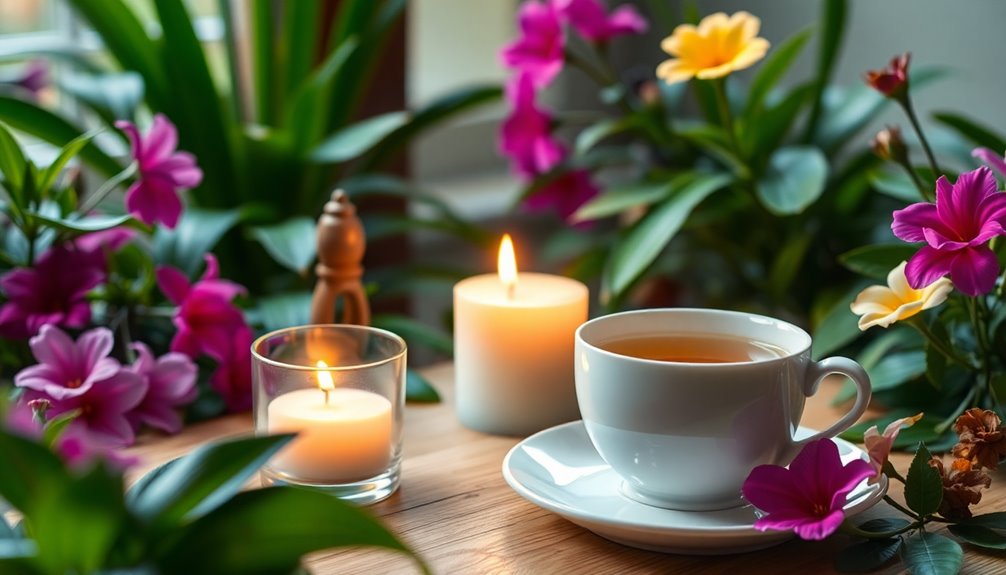
Tea not only serves as a bridge to ancient meditation practices but also enhances your sensory awareness during the experience. When you engage in tea meditation, the simple act of preparing and enjoying tea can deepen your focus and mindfulness. As you watch the tea leaves unfurl in water, you connect with the present moment. This visual engagement fosters mental clarity and keeps distractions at bay.
Holding a warm cup in your hands anchors you, creating a grounding element that helps you inhale and exhale more deeply. The soothing scent of brewing tea, especially those rich in L-theanine, can calm your nervous system, reducing stress and encouraging a tranquil atmosphere for meditation.
As you sip tea slowly, pay attention to its flavor profile. This reflective state enhances your sensory engagement, making you more aware of each taste. This multi-sensory experience helps boost your mental health and enriches your meditation practice.
Cultural Rituals Surrounding Tea

Throughout history, countless cultures have embraced tea as a vital part of their rituals and social interactions. In many Asian societies, tea drinking isn't just about the beverage; it's a way to connect with others.
For instance, Japanese tea ceremonies showcase the beauty of mindfulness. Here, the preparation and serving of tea reflect Zen Buddhist values, promoting harmony and tranquility.
Chinese tea culture also shines through rituals like Gongfu tea brewing. This method emphasizes the art of tea preparation, helping you appreciate each steep's unique flavor. When you pour tea for elders, you show respect, honoring a rich tradition.
As people around the world show interest in these tea rituals, they adapt them into their mindfulness practices. By focusing on the sensory experience of tea, you can deepen your connection to the present moment.
Whether you're meditating or simply relaxing, incorporating tea into your routine can elevate your experience.
Caffeine Sensitivity in Meditation
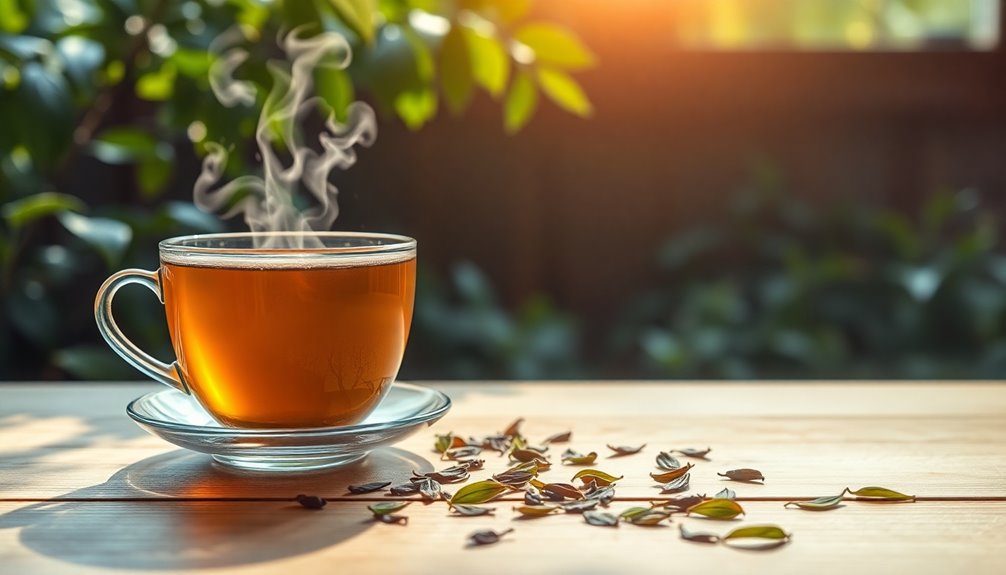
Many people find that caffeine sensitivity plays a crucial role in their meditation practices. If you're sensitive to caffeine, it can affect your ability to focus and relax during meditation.
Caffeine, found in tea, can enhance cognitive function and alertness, but it might also lead to jitters or anxiety for some. That's where L-theanine comes in. This amino acid, especially found in green tea, works alongside caffeine to create a calm yet alert state, helping you maintain mental clarity. Additionally, oolong tea contains moderate caffeine and can support mental alertness without causing jitters. Imagination can also play a role in enhancing your meditation experience by allowing you to visualize calming scenes. Choosing caffeine-free options like rooibos tea can also provide a soothing alternative that promotes relaxation. Moreover, herbal teas such as chamomile tea are known for their calming effects, making them an excellent choice for meditation.
If you notice that caffeine makes you feel anxious while meditating, consider trying lower-caffeine options like white or herbal teas. These can keep you engaged without the overstimulation.
Alternatively, decaffeinated tea offers all the benefits of a tea mindfulness practice without the caffeine buzz. You can still enjoy the warm, soothing ritual of tea while focusing on your breath and thoughts. Herbal teas, such as chamomile, are particularly beneficial for promoting relaxation during meditation.
Practical Applications

When it comes to enhancing your meditation practice, incorporating tea can be a game changer. To get started, choose a tea that excites your senses, like green or herbal tea. These teas contain L-theanine, an amino acid that helps promote alpha brain wave activity, which boosts focus and relaxation during meditation.
Before meditating, prepare your tea mindfully. As you boil the water and steep the leaves, take a moment to appreciate the warmth and aroma. This simple ritual can create a calming atmosphere that enhances your mindfulness.
While sipping your tea, pay attention to its flavor and how it makes you feel. This sensory experience helps ground you in the present moment.
As you settle into your meditation, let the combination of caffeine and L-theanine work together to improve your cognitive function and reduce stress. Notice how the warmth of the tea relaxes your body while keeping your mind alert.
Frequently Asked Questions
How Can I Focus More During Meditation?
To focus more during meditation, try setting a quiet environment, closing your eyes, and concentrating on your breath. You can also gently redirect your thoughts whenever your mind wanders, helping to maintain your awareness.
How Does Tea Help You Focus?
Tea helps you focus by providing a balanced stimulant effect from caffeine and L-theanine. This combination enhances alertness while promoting relaxation, allowing your mind to stay clear and engaged during tasks or mindfulness activities.
Why Does Tea Help You Relax?
Tea helps you relax because it contains GABA, which calms your nervous system, and L-theanine, promoting a peaceful state of mind. Its ritual encourages mindfulness, enhancing your ability to unwind and focus during meditation.
How Can the Preparation of Tea Be a Mindful and Calming Practice?
Preparing tea can be a mindful and calming practice for you. Engaging your senses with each step, from observing the color to feeling the warmth, you cultivate patience and appreciation, enhancing your overall meditation experience.
Conclusion
In conclusion, enjoying tea during meditation can really help you focus and relax. With its rich history and calming effects, tea enhances your experience and helps you connect with your senses. Whether you choose a soothing herbal blend or a gentle green tea, the right cup can make a difference. So, next time you sit down to meditate, brew a cup of your favorite tea, and let it guide you to a peaceful mind!



